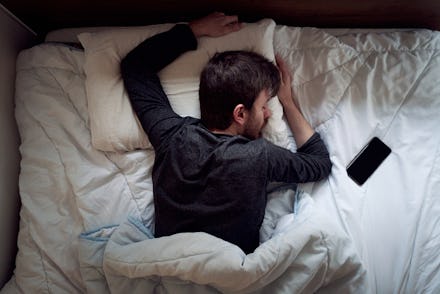Are bedtime stories the new Ambien?

The pandemic has wreaked havoc on my sleep cycle and I cannot function on low sleep. So lately, I've been using bedtime stories to fall asleep. Yes: I allow people with soothing voices on an app to lull me to sleep. A lot of other people have caught on to the trend of adult bedtime stories, too, so now there are now countless apps and podcasts that will lull you to sleep by way of stories. But even though they’ve become an important part of my bedtime routine, I can’t help but wonder whether there’s any substance to their soporific effects or if it’s simply placebo. Every single time I press play, I think, "This won't work. There's no way this will work." And then I wake up seven whole hours later, mysteriously refreshed.
Unfortunately, there’s not a lot of specific research on adults and bedtime stories — most of it concerns kids — but doctors think we can learn about our grown selves from that very research. It has a lot to do with how our brains work. “When caregivers interact verbally with children through bedtime stories, they gain improved language, which happens in the left hemisphere of the brain, and logic skills, which are processed in the frontal lobe,” explains Mehmet Oz — a.k.a Dr. Oz, host of The Dr. Oz Show and an NYC-based cardiologist and professor of surgery at Columbia University.
Children’s brains are different from adult brains in terms of how complexly developed they are, but they have the same moving parts, so to speak. So, Oz suggests that if stories help keep children’s brains busy but not agitated, they can do a similar thing for adults. “For adults, the stories can act as relief for our busy brains and shift our attention to something peaceful and serene,” he says. Think about it in practical terms. You know how sometimes you lay down and suddenly remember every single thing you’ve forgotten to do for the past ten years? Bedtime stories may keep our brains from spiraling in that way.
But stories don’t just affect the brain; some doctors think that the whole body could be affected. “Bedtime stories may help to stimulate our parasympathetic, decrease our anxiety, decrease our heart rate, and drop our blood pressure — all of which help us sleep,” says Puja Uppal, a family medicine physician in Michigan. Uppal is just hypothesizing, because of the lack of research on adults here, but she thinks that bedtime stories may be particularly effective for folks with anticipatory sleep anxiety.
Individuals who get up at night, say at 3 am, and then get anxious because they can’t sleep — this vicious circle is called anticipatory sleep anxiety, Uppal explains. Bedtime stories, she thinks, may help interrupt that particularly vicious cycle by focusing our thinking energy away from anxiety and towards whatever charming plotline — or lack thereof — we’re enjoying.
While so much of the research about bedtime stories is in children, people who have cozy memories of childhood story time may be able to tap into the same benefits of bedtime stories that children do. Adults may tap into sense memories of soothing experiences of childhood bedtime stories by replicating some of the variables, like a cozy bed and soothing voices. “The body remembers that safe comforting feeling from childhood,” Oz says, and that reminds us that it is time to go to sleep.
Another reason bedtime stories may be working for me is that I’ve been using them every single night. Repetitive action is important to forming any habit, but especially good sleeping habits, Oz says. “Sleep is a process,” Oz says. Since it doesn’t come easy to many of us, Oz recommends having a nightly ritual to aid in the process. Having a regular bedtime routine relaxes you and creates a pattern so that your body and brain know that the day is coming to an end and it’s time to rest, he says. “If your process involves a bedtime story, then why not?”